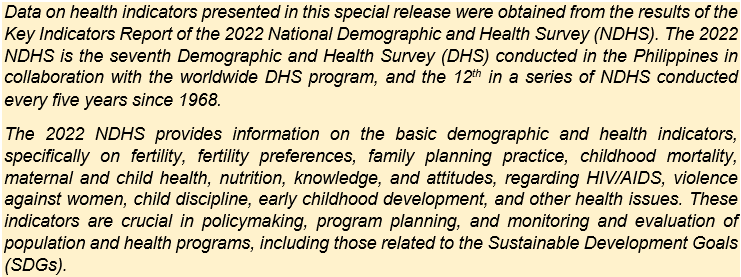
86% of Filipino women receive antenatal care from skilled providers during their pregnancy
In 2022, 86.0 percent of Filipino women who had a live birth and/or stillbirth in the two years preceding the survey received antenatal care (ANC) from skilled providers (Figure 1). This decreased by 7.0 percent from 93.0 percent in 2017.
The regions with more than 90.0 percent of women aged 15-49 years with a live birth and/or stillbirth in the 2 years before the survey who received ANC from skilled providers include Region VIII (98.9 percent), Region II (97.2 percent), Region VI (96.9 percent), Region III (94.9 percent), Region XIII (92.1 percent), and CALABARZON (91.3 percent).
89.1 percent of women in CAR received ANC from skilled providers during their pregnancy. Meanwhile, BARMM had the lowest with 47.5 percent.
ANC from a skilled provider is important to monitor pregnancy and reduce morbidity and mortality risks for the mother and child during pregnancy, at delivery, and during the postnatal period (42 days after delivery).
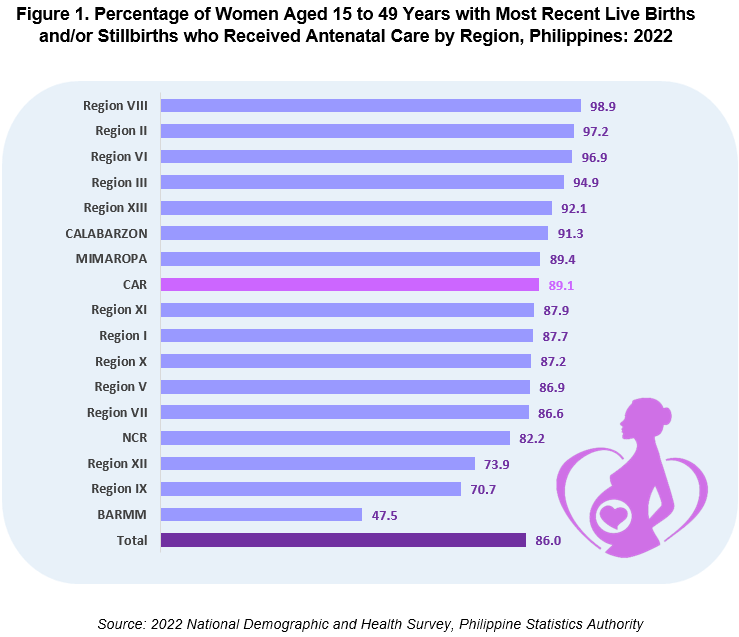
83% of pregnant Filipino women receive more than four ANC visits
The percentage of women who received four or more ANC visits during their most recent live births and/or stillbirths in the 2 years preceding the survey was 82.9 percent. This figure was lower in the Cordillera Administrative Region (CAR) with 78.6 percent.
The top 3 regions with a high percentage of women with a live birth and/or stillbirth in the 2 years before the survey who had more than four ANC visits in 2022 were Region III (92.9 percent), CALABARZON (92.2 percent) and Region XI (91.3 percent). CAR was at 78.6 percent. BARMM had the lowest with 27.9 percent (Figure 2).
86% of pregnant Filipino women receive iron supplementation
Of the women in the country who had a live birth and/or stillbirth in the 2 years preceding the survey, 86.2 percent took some form of iron supplementation during their pregnancy. Iron supplementation in women in CAR accounted for 93.2 percent.
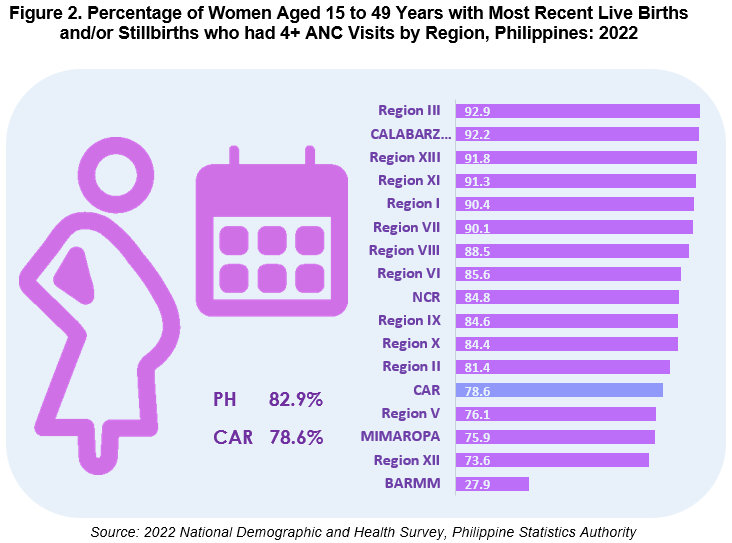
8 in 10 pregnant women receive tetanus toxoid injections
In 2022, 78.4 percent of women in the country aged 15 to 49 years received sufficient tetanus toxoid injections to protect their baby against neonatal tetanus.
The region with the highest percentage of women who had tetanus toxoid injections in their most recent births whether live birth and/or stillbirth was Region VIII with 94.9 percent while BARMM had the lowest with 52.6 percent. Meanwhile, 64.1 percent of women were protected against neonatal tetanus in CAR (Figure 3).
Tetanus toxoid injections are given during pregnancy to prevent neonatal tetanus, a major cause of early infant death in many developing countries, often due to failure to observe hygienic procedures during delivery.
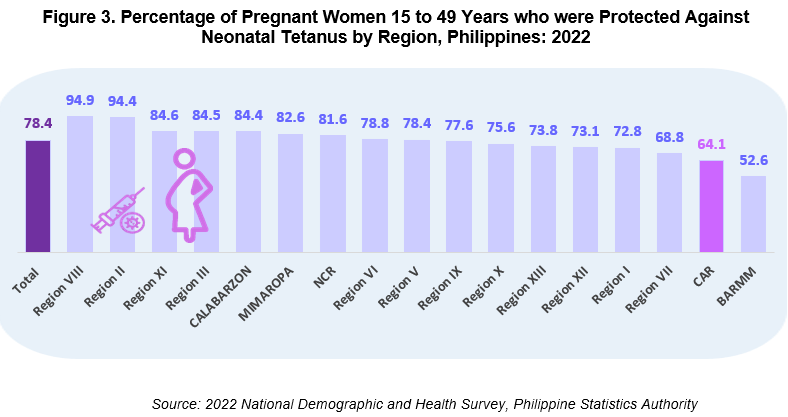
9 in 10 birthing women in Cordillera are assisted by skilled providers
Among regions, CAR had the highest percentage of births delivered assisted by a skilled provider that includes a doctor, nurse, and midwife with 98.5 percent, followed by Region I with 97.9 percent, and Region III with 97.8 percent, respectively (Figure 5).
Regions with the highest percentage of live births and/or stillbirths undertaken in a health facility in 2022 were Region I with 97.9 percent, Region III with 97.0 percent, and Region VII with 95.4 percent. In CAR, 92.9 percent of live births occurred in health facilities that include hospitals, birth centers, and medical clinics.
In general, the percentage of live births in the country assisted by a skilled provider increased from 62.0 percent in 2003 to 89.6 percent in 2022 (Figure 4).
By age, more women aged 35 to 49 years had undergone a cesarean operation during delivery (26.9 percent) compared to women aged 20 to 34 years (18.3 percent), and women below 20 years old (14.6 percent).
Access to proper medical attention and hygienic conditions during delivery can reduce the risk of complications and infections that could lead to death or serious illness for the mother, the baby, or both (Van Lerberghe and De Brouwere 2001; WHO 2006).
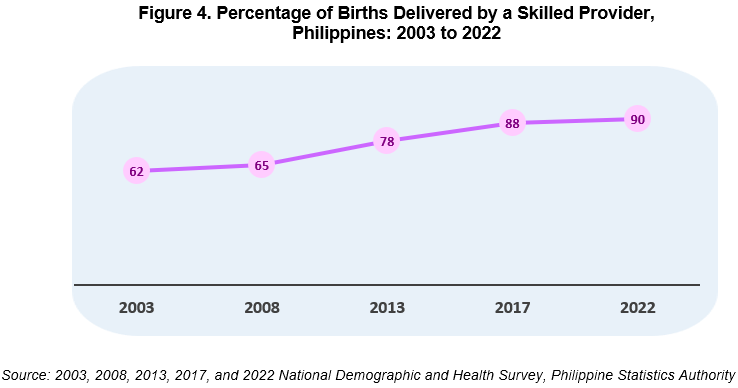
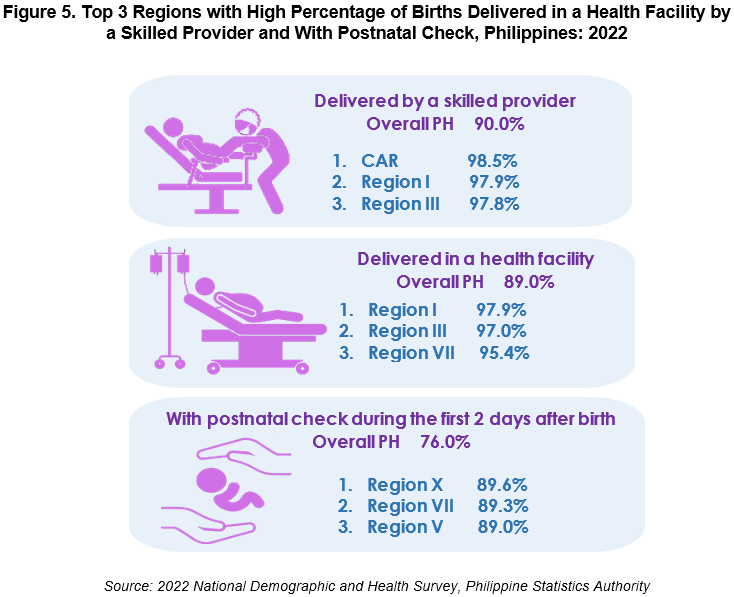
75% of women who gave birth undergo postnatal care
Among Filipino women aged 15 to 49 years who had a live birth and/or stillbirth in the 2 years preceding the survey in 2022, 75.4 percent had postnatal checks during the first 2 days following the birth.
The percentage of women who had a postnatal check during the 2 days following their most recent births varies from region to region, from 44.5 percent in BARMM to 89.6 percent in Region X. In CAR, 84.9 percent of women had postnatal checks.
Postnatal care (PNC) for both the mother and the child is important, especially in the first 48 hours or 2 days after birth or delivery to prevent maternal and neonatal deaths. This is to treat any complications that may arise from the delivery and provide the mother with important information on how to care for herself and her baby. Safe motherhood programs are also strongly recommended for women to receive a check of their health during the first 2 days after giving birth.
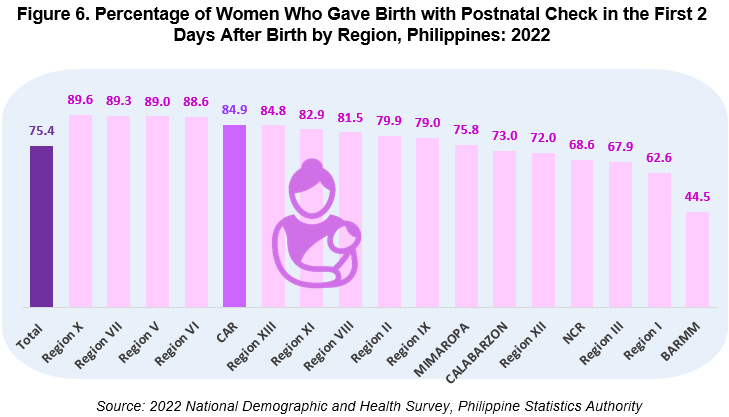
(SGD)
VILLAFE P. ALIBUYOG
Regional Director
______________________________________________
TECHNICAL NOTES
Antenatal care (ANC) from a skilled provider – Pregnancy care received from skilled providers, such as doctors and nurses/midwives. ANC from a skilled provider is important to monitor pregnancy and reduce morbidity and mortality risks for the mother and child during pregnancy, at delivery, and during the postnatal period.
Delivery care - Access to proper medical attention and hygienic conditions during delivery can reduce the risk of complications and infections that could lead to death or serious illness for the mother, the baby, or both (Van Lerberghe and De Brouwere 2001; WHO 2006).
Eligible women - women aged 15 to 49 years who had a live birth or stillbirth in the 2 years before the survey.
Institutional deliveries - deliveries that occur in a health facility.
Maternal care - refers to maternal care as the health of women during pregnancy, childbirth, and the postnatal period (WHO). Proper care during pregnancy and delivery is important for the health of both the mother and the baby.
Postnatal care - care (PNC) for both the mother and the child after birth is important to treat any complications arising from the delivery, as well as to provide the mother with important information on how to care for herself and her child. Safe motherhood programs recommend that all women receive a check of their health during the first 2 days after birth.
Skilled assistance during delivery - births delivered with the assistance of doctors and nurses/midwives (skilled providers).
Tetanus toxoid - Protection against neonatal tetanus: The number of tetanus toxoid injections needed to protect a baby from neonatal tetanus depends on the mother’s vaccinations.
A birth is protected against neonatal tetanus if the mother has received any of the following:
- Two tetanus toxoid injections during the pregnancy
- Two or more injections, the last one within 3 years of the birth
- Three or more injections, the last one within 5 years of the birth
- Four or more injections, the last one within 10 years of the birth
- Five or more injections at any time prior to the birth
Tetanus toxoid injections are given during pregnancy to prevent neonatal tetanus, a major cause of early infant death in many countries. Neonatal tetanus is often caused by failure to observe hygienic procedures during delivery.



